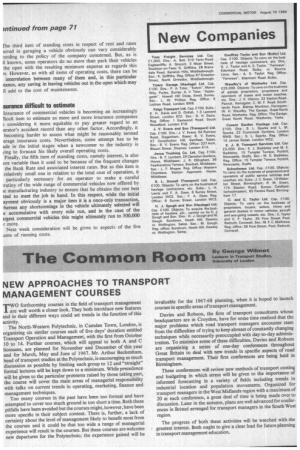NEW APPROACHES TO TRANSPORT MANAGEMENT COURSES
Page 74

If you've noticed an error in this article please click here to report it so we can fix it.
TWO forthcoming courses in the field of transport management are well worth a closer look, They both intrdduce new features and in their different ways could set trends in the function of this activity.
The North-Western Polytechnic, in Camden Town, London, is organizing six similar courses each of five days' duration entitled Transport Operation and Management, with the first from October 10 to 14. Further courses, which will appeal to both A and C licensees, are planned for November and December of this year and for March, May and June of 1967. Mr. Arthur Beckenham, head of transport studies at the Polytechnic, is encouraging as much discussion as possible by limiting each group to 12 and "straight" formal lectures will be kept down to a minimum. While precedence will be given to the particular problems raised by those taking part, the course will cover the main areas of managerial responsibility with talks on current trends in operating, marketing, finance and management techniques.
Too many courses in the past have been too formal and have attempted to cover too much ground in too short a time. Both these pitfalls have been avoided but the courses might, however, have been more specific in their subject content. There is, further, a lack of certainty about the level of management likely to benefit most from the courses and it could be that too wide a range of managerial experience will result in the courses. But these courses are welcome new departures for the Polytechnic; the experience gained will be invaluable for the 1967-68 planning, when it is hoped to launch courses in specific areas of transport management.
Davies and Robson, the firm of transport consultants whose headquarters are in Croydon, have for some time realized that the major problems which road transport managers encounter stem from the difficulties of trying to keep abreast of constantly changing techniques while necessarily preoccupied with day-to-day administration. To minimize some of these difficulties, Davies and Robson are organizing a series of one-day conferences throughout Great Britain to deal with new trends in specific aspects of road transport management. Their first conferences are being held in Birmingham.
These conferences. will review new methods of transport costing and budgeting in which stress will be given to the importance of informed forecasting in a variety of fields including trends in industrial location and population movements. Organized for transport managers in the West Midlands region with a maximum of 20 at each conference, a great deal of time is being made over to discussion. Later in the autumn, plans are well advanced for conferences in Bristol arranged for transport managers in the South West region.
The progress of both these activities will be watched with the greatest interest. Both ought to give a clear lead for future planning in transport management education.




































































































































